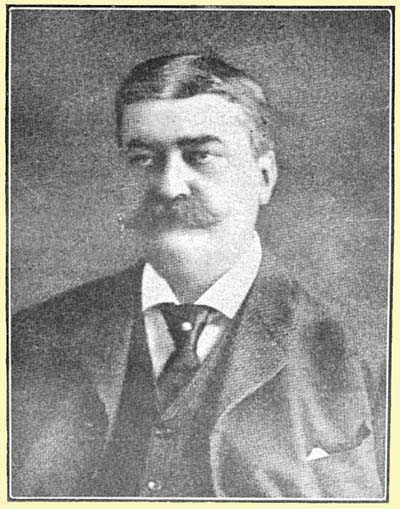 |
Victor
|
The
Pinkerton Labor Spy
by
Morris Friedman

CHAPTER X.
THE CRIPPLE CREEK STRIKE—CONTINUED.
A few days after the Florence & Cripple Creek Railroad job, a tragedy occurred in the Vindicator Mine, which shocked the entire district. Supt. Charles McCormick and shift boss Melvin Beck were killed instantly by a terrific explosion of giant powder at the six-hundred-foot level of the mine.
Was this explosion the result of a conspiracy, or was it a mere accident? One would naturally suppose that a thorough investigation would have been the first thing instituted; but here is what actually did take place.
The Miners' Unions immediately held meetings and passed resolutions expressive of their sorrow, demanding a thorough investigation, and condemning in the strongest language the perpetrators of the outrage, if it should be found that the explosion was not accidental. The union further offered to assist in clearing up the unfortunate event.
The allied forces at once raised a terrible cry that the Inner Circle of the Federation of Miners had caused the explosion.
Instead of troubling to make an investigation, General Bell promptly arrested over a dozen of the most prominent Federation leaders, among them Sherman Parker and C. G. Kennison, and threw them into the bull pen. He then instructed his cavalry to patrol the district day and night, and when he had thus secured the Cripple Creek district from the dynamiting outlaws of the Inner Circle, he summoned the representatives of the press, and made this declaration:
"Conditions in Cripple Creek and Telluride are simply awful. The average citizen of the State has no idea of the critical conditions in the two camps. People of both camps are beginning to awaken to the danger they have been placed in by the conspirators, and but for the military there would surely have been a lynching bee or two before this.

Wm. A. Pinkerton
"The conspiracy in Cripple Creek was gigantic. We have positive information that the intention of the conspirators was to blow up four more mines. In this way they hoped to scare the miners and close up the entire camp.
"After blowing up the Vindicator the plans were to blow up one mine after another. This was to occur Sunday and Monday. The conspirators well knew that the military would be on their way to Telluride, and they hoped to catch the soldiers between here and Telluride. In that way they thought they would put Governor Peabody up against it. They expected to throw him off his guard. The conspiracy further included the touching off of a mine in Telluride if necessary.
"It was a deep-laid plot and would have carried to perfection, but for the prompt sending of the military to Cripple Creek, the surrounding of the town and the prompt arrests."
About a week after this confident utterance, the coroner's jury brought in a verdict that they were unable to determine the exact cause of the explosion.
Notwithstanding the decision of the coroner's jury, the military kept Parker, Kennison and a number of others in the bull pen for many weeks, on the charge of conspiring to blow up the Vindicator mine. When the case finally came up for trial the prosecution had no evidence to speak of, and all the accused were given their liberty.
But even after the accused union men were formally acquitted, the allied forces still charged the Federation with the crime, and to this day they will hold up their hands in horror, and tell you the blood-curdling story how the Western Federation of Miners blew up the Vindicator mine in 1903.
The only thing to be said as to the assertions of the military and Mine Owners' Association is this: If, indeed, they had information as to the identity of those men who blew up the Vindicator mine, and intended to blow up the rest of the Cripple Creek district, it was their duty to give this information to the public authorities, so that the guilty parties could be hanged for the murder of Mr. McCormick and Mr. Beck. The refusal of the mine owners and military to divulge this information, makes them accessories to the crime; or if, on the other hand, despite their claims, they did not possess any evidence, it simply shows them up to be liars.
Henceforth the military became so active that people ceased speculating as to what they might do next.
General Bell, doubtless prompted by an abler mind than his, got up one plan which was certainly very shrewd, and dared he have executed it, the strike would have been quickly broken. This plan was known as the "Vagrancy Arrest Scheme."
Over two thousand miners were on strike, and received support from the Federation. Many of these miners owned property and had funds of their own, besides the relief given them by the union. These facts were well known to the mine owners and military, but not in an official sense. Officially they only knew that there were over 2,000 men in the district who had thrown down their usual employment, and were loafing around, with no visible means of support.
According to the proclamation of Governor Peabody, Teller County was in a state of insurrection and rebellion. The military knew that a couple of thousand men were idle and existed without any visible means of support, which was a very suspicious circumstance. In the opinion of the military, it was against the interests of the public safety to permit such a large body of men to remain idle during the continuance of the rebellion, therefore, here is what they proposed to do:
To ignore the fact that there was a strike in progress, to designate the strikers as vagrants or tramps, and arrest them en masse as such.
These vagrants and tramps would then be brought before a justice of the peace, who would impose a heavy fine on each of them; but being a kind-hearted judge, and not wishing to impose a hardship on the poor tramps, he would suspend the fine, on condition that they go to work, or leave the camp. As a majority of the strikers were married men and property owners, it was hoped by the allies that they would give up the struggle in despair.
If only a few dozen men had been involved, the scheme would have worked well; but the strikers numbered about two thousand, and to execute it against such a number of people shocked even the iron nerve of the military, so that it all ended in talk, for a while. We shall have occasion to see how, in an improved and amended form, this plan was successfully accomplished.
The attempted derailing of a train and the explosion at the Vindicator mine terribly alarmed Governor Peabody, for on December 3rd, 1903, he placed Teller County under martial law.
The governor's proclamation reads so like a declaration of war against the striking miners, that we must believe it was composed for him by the secretary of the Mine Owners' Association. Here is an extract:
"There exists in Teller County, State of Colorado, one or more organizations controlled by desperate men who are intimidating the civil authorities, and who are setting at defiance the Constitution and laws of the State of Colorado, so that the citizens of said County of Teller, by reason of threats, intimidation and crimes, committed by certain lawless persons in said County, are unable to enjoy their civil rights in the judgment of the commander of the military forces holding it, and it is now found to be necessary to preserve order and maintain quiet by the administration of military authority.
"The military district commander, therefore, will cause the County to be governed until the restoration of municipal authority, and his further orders by military authority, as a measure for which it would seem the previous recital furnishes sufficient precedent."
We would ask but two questions, namely: Who overthrew municipal government in Teller County? Who defied the constitution of the United States and of Colorado, and defied, intimidated and insulted the District Court of Teller County?
The following extract from the governor's proclamation is also interesting:
"All persons, who may heretofore have given aid and solicitation to any of the heretofore mentioned organizations, or have been in their service, who shall return to peaceful occupation and preserve quiet and order, holding no further correspondence, nor giving aid nor comfort to the heretofore mentioned organizations, will not be disturbed either in person or property, except so far, under the orders of the military district commander, as the exigencies of the public service may render necessary."
This proclamation was really in the nature of a bluff, because even before the issuance of a formal order the county was under the absolute domination of the military. But the allies thought that the miners might possibly be frightened into giving up the struggle when they discovered that the civil authority of the county had been replaced by the arbitrary and tyrannical ordinances of martial law, court martial and articles of war.
The last part of the proclamation is of particular interest, as it was actually addressed to the five hundred union miners working for Mr. James F. Burns of the Portland mine. It implied a threat.
In so many words this part of the proclamation told the Portland miners that if they would cease supporting their striking comrades, they would not be disturbed either in person or property; but that, if they persisted in contributing to the strike fund of the Federation, all the trials and persecutions that usually follow in the wake of martial law would be let loose on their devoted heads.
The union miners working in the Portland mine knew well enough that they might expect the worst if they disobeyed the governor's proclamation; but they remained true to their principles, and kept on working, and contributed their money as regularly as ever to the support of their striking brothers.
It did not take the state administration long to find out that their bull-dozing tactics could not intimidate the Federation into hoisting the white flag. But if the military could make no impression on the Federation, they could at least harass and annoy them; and with this laudable object in view, they placed a censor over the Victor Daily Record, the official organ of the miners, and thenceforth the Record had to submit copies of its daily editorials to the military censor.
As a result of the actions of Governor Peabody and General Bell, conditions in Teller County, Colorado, were so unique, and presented such interesting pictures of legalized anarchy, that it is a wonder so little attention was paid to them by the lynx-eyed reformers of our country.
It is equally a problem to understand why the President of the United States, who is such a great hand at making and unmaking republics and righting far distant wrongs, despite the fervent appeals and prayers of the workers of Colorado, turned a deaf ear to all entreaties, without saying a single word of reproof, without doing a single act on behalf of outraged justice.
Chapter XI. The Cripple Creek Strike. The Writ of Habeas Corpus.